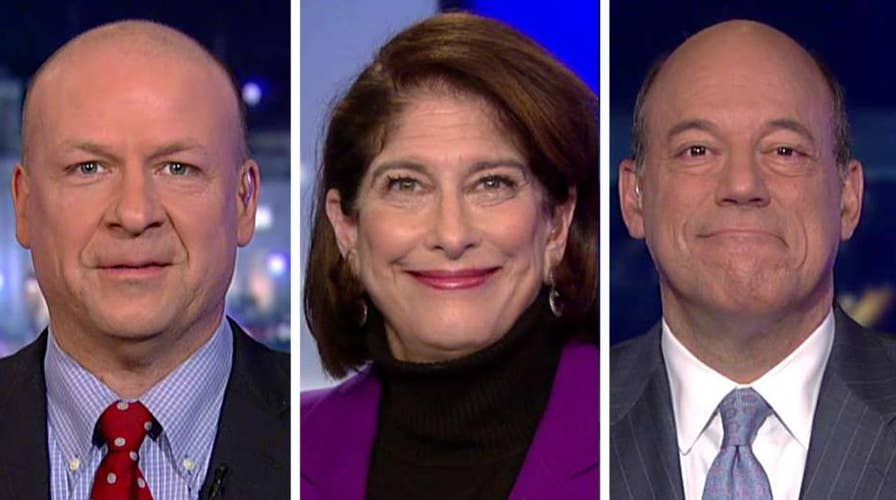Democratic senators press William Barr over Special Counsel Robert Mueller's investigation.
Trump's attorney general nominee vows independence from the president; reaction and analysis from the 'Special Report' All-Stars.
Former Attorney General William Barr underwent his confirmation hearing on Tuesday before the Senate Judiciary Committee under the new chairmanship of Sen. Lindsey Graham, R-S.C., and emerged without a scratch, scrape or bruise. He came across as a consummate professional and a deeply knowledgeable, capable, and very experienced attorney – someone former Attorney General Michael Mukasey has called “probably the best-qualified nominee for U.S. attorney general since Robert Jackson in 1940.”
The calm, respectful atmosphere of the hearing was completely different from the venomous circus that prevailed during the last major confirmation hearing before the Judiciary Committee, when Brett Kavanaugh was being considered for the U.S. Supreme Court.
Democratic senators asked Barr tough questions about his views on everything from criminal justice reform to immigration enforcement to the Mueller investigation, but they seemed almost subdued compared to their rancorous questioning of Kavanaugh. And unlike the last time, the hearing was not constantly interrupted by screaming protesters who had to be carried out by the Capitol Police.
One of the most important takeaways from the hearing was Barr’s explanation that this was not a position that he was pursuing. The administration came to him, not the other way around. He is partially retired and he has been attorney general before, so it is not as if he is taking this job because he has lofty political ambitions. Barr has always been known in Washington as someone who is independent and not afraid to say what he thinks, and it seems obvious that he has no intention to use the office as a springboard to run for higher office.
Barr said during his hearing that he would not be bullied by anyone into taking any actions that he did not consider proper or in accord with the rule of law, including editorial boards, Congress or the president. He would not interfere with the investigation by special counsel Bob Mueller, whom he has known for 30 years, although he would carry out his duty as specified in Justice Department regulations to oversee the work of the special counsel.
Barr refused to agree to recuse himself as former Attorney General Jeff Sessions did when Sen. Mazie Hirono, D-Hawaii, tried to get him to say he would. She pushed Barr to agree to do whatever ethics officials at Justice recommended, but Barr stayed firm that while he would listen to their advice and counsel, it was the attorney general’s job to make the final decision on such ethics issues and all other matters.
Barr said that just like the prior president he worked for, George H.W. Bush, President Donald Trump had “sought no assurances, promises or commitments” from Barr “of any kind, either express or implied.” Further, Barr had not given the president any promises on any cases or investigations, including the Mueller probe, other than to run the Justice Department “with professionalism and integrity,” which is something that is very needed at the Justice Department.
Barr probably got the most questions about a memorandum he wrote to Deputy Attorney General Rod Rosenstein and Assistant Attorney General for the Office of Legal Counsel Steve Engel as a private citizen in 2018 about the Mueller investigation, which explained his view of the application of a specific provision of the U.S. Code on tampering with a witness or evidence.
As Barr explained, he was not suggesting that a president can never obstruct justice, but that pursing an obstruction of justice charge on the basis of the president exercising his constitutional discretion in a facially-lawful way – for example, by removing or appointing an official – is not valid if the “application would involve a possible conflict with the President’s constitutional prerogatives.”
Barr did not back down during the hearing in explaining his view on this issue, which former Justice Department Assistant Attorney General and Harvard law professor Jack Goldsmith says has “significant support in Supreme Court case law and executive branch precedent.”
The constant and recurring theme throughout all of Barr’s answers was the importance to him of adhering to the rule of law, abiding by Justice Department rules and regulations, carrying out the duties of the attorney general in an independent, nonpartisan manner, and ignoring the dictates of the media, Congress and other outside sources. Barr was never caught short by any of the questions.
CLICK HERE TO GET THE FOX NEWS APP
The Judiciary Committee is hearing from a series of other witnesses as well, including former Attorney General Michael Mukasey, former Deputy Attorney General Larry Thompson, and Professor Jonathan Turley of the George Washington University School of Law.
But nothing arose in Barr’s testimony that would seem to jeopardize his confirmation. Given the fact that he was unanimously confirmed on three prior occasions by the Senate, including as attorney general, and given his noteworthy performance before the Judiciary Committee, Barr is almost certain to be confirmed, and it seems likely that this Trump nominee might actually get some votes from Democratic senators, too.










































